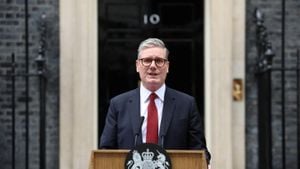Recent diplomatic maneuvers involving Iran and Lebanon highlight the complexity and pressures surrounding ceasefire negotiations between Israel and Hezbollah. Ali Larijani, a prominent aide to Iran’s Supreme Leader Ayatollah Ali Khamenei, has made it clear during his visit to Beirut, Lebanon, on Friday, Nov. 15, 2024, his country’s intention to support any decisions made by the Lebanese government and Hezbollah. Amid bombings and rising casualties, his remarks signify Iran's entrenched alliance with Hezbollah, which is now under unprecedented pressure amid Israel's sustained military operations.
The backdrop to these high-stakes discussions is the stark humanitarian crisis precipitated by Israel's extensive military campaign against Hezbollah, which began with the flare-up following Hamas’ attack on Oct. 7, 2023. Reports indicate over 3,300 people have lost their lives due to Israeli strikes, with Lebanese Health Ministry officials highlighting the toll, particularly geared toward civilians, as many families have fled their homes under the bombardment.
The talks hosted by Larijani involved key Lebanese political figures, including caretaker Prime Minister Najib Mikati and Speaker of the Parliament Nabih Berri, who has been actively representing Hezbollah's interests. Both leaders have expressed hopes for a ceasefire, strongly urging Iran to leverage its influence to facilitate negotiations. Mikati characterized this as part of Lebanon's broader strategy to restore national unity and resist pressures from any external parties during these negotiations.
During his discussions, Larijani maintained, “We will approve and support any decision by the Lebanese resistance and the Lebanese government.” The Iranian envoy dismissed accusations aimed at Iran potentially sabotaging negotiations, instead laying blame at Israeli Prime Minister Benjamin Netanyahu's feet, accusing him of disrupting efforts to broker peace.
The United States is also heavily involved, with Ambassador Lisa Johnson presenting the Lebanese Parliament with a draft ceasefire proposal. Notably, the proposal is framed around the United Nations Security Council Resolution 1701, which had previously sought to end hostilities between Hezbollah and Israel after their last major conflict settled over Lebanon's southern borders. This resolution necessitates the disarmament of Hezbollah and retains peacekeeping troops to oversee the area. Yet, its stipulations have often led to friction, as Hezbollah has long been resistant to disarmament.
The prospect of this new ceasefire agreement hinges on Israel's terms, which include demands for guarantees against Hezbollah's rearmament. Such conditions have been met with skepticism from Lebanese officials, who argue these clauses breach national sovereignty, framing them as unacceptable. Instead, they echo calls for the complete implementation of Resolution 1701 sans alterations.
Berri's discussions have included references to international oversight potentially undermining Lebanese autonomy, stating unequivocally, “The U.S. and others know this is unacceptable.” This recurring contention highlights the difficulties inherent to external mediation, particularly when it involves nuanced local politics and prior grievances.
The immediate effects of the airstrikes have been catastrophic, with Israel inflicting severe damage on urban infrastructures such as residential buildings. Images and videos posted on social media have shown crumbling skylines and massive clouds of dust engulfing neighborhoods. International reactions to these developments have ranged from concern to condemnation. The European Union has denounced the killing of at least 12 paramedics during the recent attacks, branding these acts as grave violations of international humanitarian law.
The humanitarian crisis deepens as the United Nations Interim Force (UNIFIL) confirms direct hits against its infrastructure, raising alarms about the safety and viability of peacekeeping operations. The organization has reiterated calls for stronger protections for peacekeeping forces deployed within Lebanon, especially amid the rising dangers of sustained conflicts.
Notably, Larijani's presence is seen as part of Iran's strategy to assert influence over Hezbollah and the broader Lebanese political framework during this chaotic backdrop. His post-meeting comments focused on Iran’s enduring support for Lebanese sovereignty and resistance to Israeli military actions. By reassuring Lebanese authorities of Iran's intent to back its decisions, Larijani hopes to cement Iranian ideological and military ties to Hezbollah, which Iran has financially and militarily sustained for decades.
While Hezbollah has also faced significant challenges due to Israel’s military actions—in terms of both leadership losses and diminished territorial control—the militant group's resilience remains evident as it continues its rocket assaults on northern Israel. This duality of military engagements presents complex layers as both parties grapple for dominance, resulting not just in military but also political repercussions.
Continuing attacks from Israeli forces have fueled fears of broader escalatory cycles, bringing Lebanon to the brink of renewed humanitarian despair. With these discussions hanging precariously, watching how both Israel and regional allies respond to developments poses significant risks for peace—an enduring theme throughout this long-standing conflict.
While little detail has been finalized, optimism surrounding the ceasefire efforts appears cautiously guarded. Israeli officials claim the ceasefire talks have reached their most promising state since hostilities reignited, with some optimism enabled by the diplomatic heft of U.S. meddling. Yet, the gravity of these statements quickly meets the realities on the ground, with no immediate cessation of fire observed.
The interplay of Iranian support, external diplomacy via the U.S., and local Lebanese politics amounts to a multi-dimensional puzzle where every piece must fit perfectly to achieve lasting stability. Even amid the sufferings endured by innocents during conflict, achieving peace remains as elusive as ever, with negotiations proceeding tentatively but increasingly urgently as death tolls rise and the threat of renewed warfare looms large.
With U.N. calls for adherence to prior resolutions echoing and Hezbollah maintaining its hardline posturing, local and regional observers remain watchful, hoping not just for triggers of peace discussions, but tangible advancements. Coming days and weeks stand to be pivotal as Lebanon’s leadership navigates between Iranian allegiance and international pressures to reach what can only be described as desperately needed resolutions.



